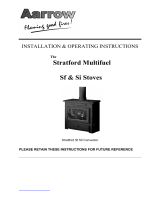
INSTALLING A WORKTOP OR PANEL (Continued)
FIXING TO BRICKWORK.
When fixing a Wood panel to a brick pier you must ensure that the brickwork is completely dry. As a precaution glue a damp-proof barrier foil to the side or
underside of the Wood panel that has already been well oiled and dried. Fix with adhesive. This will help form a moisture barrier between the Wood panel and the
brickwork. We also advise that alternate fixing points be made along the length of the Wood panel to prevent it from bowing.
CORNER JOINTS.
When joining two Wood panels together it is recommended that both biscuit joints and standard Wood panels bolts are used in order to avoid temperature warping
at a later stage. Treat the joining edge and the underneath of the Wood panel lavishly with oil before joining and fitting the Wood panels.
INSERTING HOBS, TILES OR STONE MATERIALS.
Always leave a 5mm expansion gap. Use silicone sealant when fitting and filling expansion gaps. The wood may crack if you do not allow for expansion gaps.
Range cookers, such as AG A's, require a minimum expansion gap of 40 mm due to the constant heat source from these cookers.
KITCHEN APPLIANCES.
If a dishwasher or washing machine is to be installed under the Wood panel it is recommended to glue an insulation reflective foil and moisture barrier to the
underside of the Wood panel to protect it from intense heat. A minimum 25mm gap should be allowed for ventilation above the appliance. Leave a 15mm gap
between the end of tops and appliances, cut-outs for appliances and sinks.
FITTING AN INSET SINK
This is the same procedure as with fitting a laminate Wood panel. Expansion gaps must be left and sealed with silicone sealant. Take great care when installing
sinks into timber Wood panels, due to the possibility of water penetration into the joints. When positioning and making a cut-out for a hob always follow the
manufacturer's instructions for sizes, safety clearances, and sealing with silicone sealant.
UNDERMOUNTING SINKS.
The skills required for undermounting Belfast type sinks in a solid hardwood Wood panel is best left to expert fitters.
CARE & MAINTENANCE
OIL WOOD PRIOR TO INSTALLATION – APPLY LAVISHLY.
Prior to installation you must generously oil all the surfaces of the wood panel, paying particular attention to the underside, cut edges and back edges. Once
the Wood panel has been fitted these areas and cut edges may be inaccessible. We recommend that all cut edges and end grains will need a further 2 coats (for
a total of 3 coats) to ensure that the Oil has penetrated deep into the wood. When oiling remember to wipe away the excess oil after 15 minutes and then allow to
dry for 6 - 8 hours prior to further applications. Please give special attention to the oiling of the end grains and cut ends to seal them properly. Apply the oil with a sponge or
soft cloth. Never use steel wool to sand the surface as this may cause the Wood panel to become discolored when damp.
ONGOING MAINTENANCE OF THE WOOD PANEL
In the first few weeks of use some care must be taken to prevent Wood panels becoming stained before they have built up sufficient protection. Avoid letting water
build up on the work surface, wipe off using a cloth. The Wood panels require to be oiled again within the first week of installation. Apply a thin coat of the same type
of oil, leave for 15 minutes and then wipe off the excess. This is best done at night to allow maximum time for the wood panel to dry off, overnight. After the first
week, oiling once a week will suffice with the interval between treatments gradually increasing until eventually you are just wiping wood panels with an oily cloth
once a month or so to restore the sheen that has built up. As a useful hint, the wood panel will need oiling when water on the surface smudges rather than forms a
well-defined water droplet, or when the Wood panel feels dry.
REPAIR AND LONG TERM MAINTEANCE.
After years of hard use your wood panel may sustain some stains, scrapes and grazes. To refurbish your wood panel, lightly sand it down with a sanding machine or with
fine sandpaper. For smaller areas of damage, sand locally and oil again.
TIPS
•Hot pans should be placed on a pan stand or similar and not directly onto the worksurface.
•Always use a chopping board for food preparation, not the worksurface.
•Avoid letting water build up on the worksurface, wipe off using a cloth.
•The surface should be cleaned with a warm damp cloth with a little washing up liquid.
•Re-oil your Wood panel and workstation regularly.
PRECAUTION
Cloths and sponges used when treating your Wood panel with oil may become FLAMMABLE. Please store or dispose of them safely.
2019 Interbuild Distribution (US) LLC, a Division of Interbuild Holding, LTD, Hong Kong. L7: Installation, Care and Maintenance Instructions








